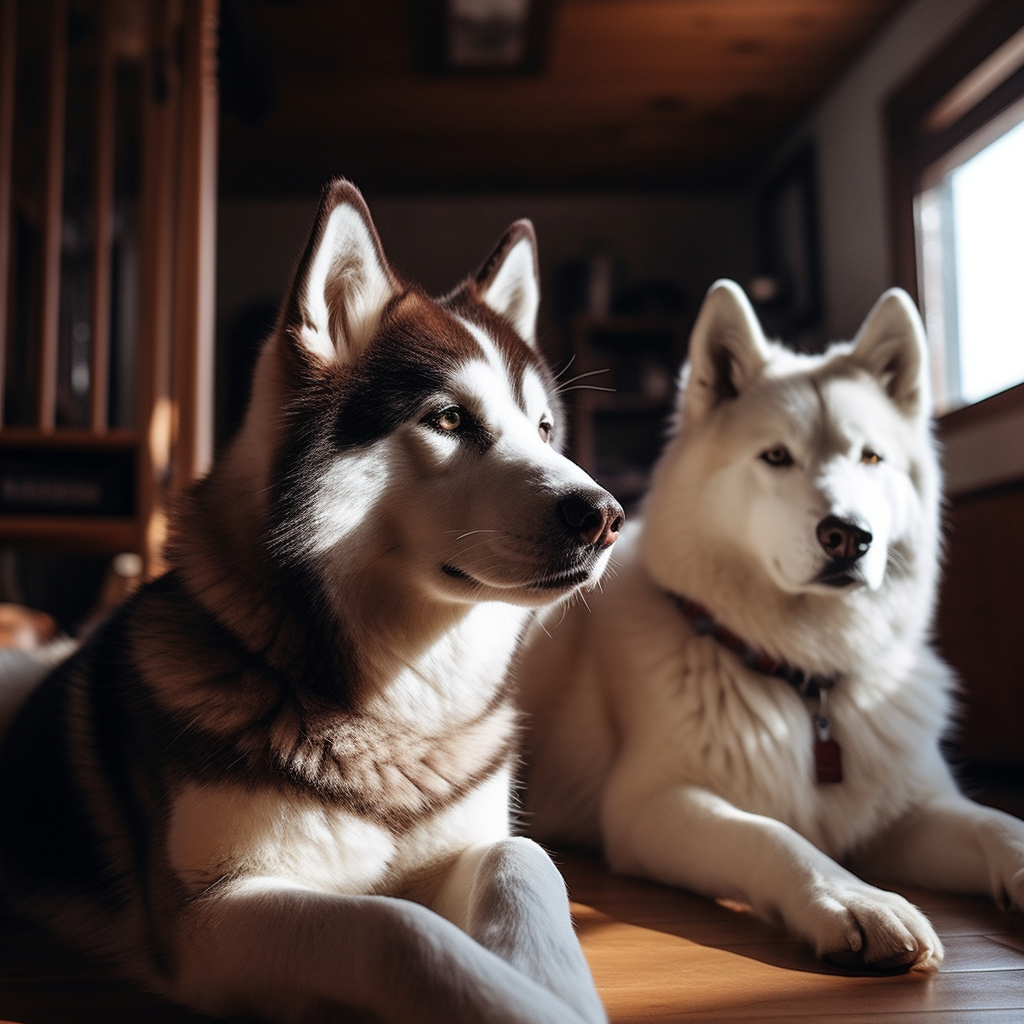Siberian Huskies are known for their striking appearance, intelligence, and playful personalities. However, they can also exhibit some challenging behavior problems that may prove difficult for their owners. By understanding these issues and how to address them, you can help your Husky become a well-mannered and happy companion. In this article, we’ll discuss some of the most common Husky behavior problems and offer guidance on how to tackle them. See also: Husky Personality and Temperament >>

1. Excessive Vocalization: Howling and “Talking”
Huskies are renowned for their vocal nature, which can range from melodic “talking” to powerful howling. While these vocalizations can be endearing, they may become problematic when they are excessive or disruptive. To manage this Husky behavior problem, try the following:
- Ensure your dog receives adequate mental and physical stimulation to prevent boredom-induced vocalizations.
- Train your Husky to respond to a “quiet” command using positive reinforcement techniques.
- Consider using white noise machines or soundproofing solutions to minimize the impact of your dog’s vocalizations on neighbors.
2. Destructive Behavior: Chewing, Digging, and More
One of the most common Husky behavior problems is destructive behavior, which can include chewing on furniture, digging in the yard, or damaging household items. To curb these behaviors, consider the following tips:
- Offer appropriate chew toys and engage in regular play sessions to help your Husky satisfy their natural desire to chew and play. For puppies, see also Husky puppy biting for specific advice.
- Provide ample physical exercise and mental enrichment to reduce boredom and excess energy that may lead to destructive behavior.
- Implement crate training or use a playpen to confine your Husky to a safe space when they cannot be supervised.

3. Stubbornness and Training Difficulties
Huskies are intelligent and independent dogs, which can sometimes result in stubbornness and training challenges. To overcome this behavior problem, try these strategies:
- Use positive reinforcement techniques, such as praise and treats, to encourage your Husky to cooperate during training sessions.
- Keep training sessions short and engaging to maintain your dog’s interest and motivation.
- Establish a consistent routine and set clear expectations for your Husky’s behavior to minimize confusion and encourage compliance.
4. Husky Behavior Problems: Escaping and Roaming

As a breed with a strong desire for exploration, Huskies are notorious escape artists. They may find creative ways to slip out of enclosures, scale fences, or dig under barriers. To address this behavior problem, take the following steps:
- Ensure your yard is secure, with tall, sturdy fencing that extends below ground level to prevent digging.
- Install locks or latches on gates to prevent your Husky from opening them.
- Microchip your dog and keep their identification tags up-to-date to facilitate a safe return if they do manage to escape.
See also: Husky Crate Training >>
5. High Prey Drive: Interactions with Smaller Animals
Another common Husky behavior problem is their high prey drive, which can make interactions with smaller animals like cats, rabbits, or rodents challenging. To manage this issue, consider these suggestions:
- Supervise interactions between your Husky and smaller animals closely and intervene if necessary.
- Teach your Husky the “leave it” command to redirect their attention away from smaller animals.
- When walking your Husky, use a secure harness and leash to prevent them from lunging or chasing after other animals.
6. Separation Anxiety
Some Huskies may develop separation anxiety, which can lead to destructive behavior, excessive vocalizations, or other issues when left alone. To address this Husky behavior problem, try the following:
- Gradually acclimate your dog to being alone by leaving them for short periods and gradually increasing the duration.
- Offer interactive toys and puzzles to occupy your Husky’s mind while you are away.
- Consider using a dog walker or doggy daycare service to provide companionship and exercise during your absence.
7. Husky Behavior Problems: Socialization Challenges
Proper socialization is essential for preventing aggression, fearfulness, or other unwanted behaviors in Huskies. To ensure your dog is well-socialized, consider the following:
- Expose your Husky to a wide variety of people, animals, environments, and experiences during their critical socialization period (between 3 and 14 weeks of age).
- Continue socializing your dog throughout their life to maintain positive associations with new experiences.
- Enroll in a puppy socialization class or attend dog-friendly events to provide structured opportunities for interaction.

Conclusion
While Husky behavior problems can be challenging, understanding the root causes and implementing appropriate strategies can help you and your dog enjoy a harmonious relationship. Remember that patience, consistency, and positive reinforcement are key when addressing any behavioral issue. If you continue to struggle with your Husky’s behavior, consider consulting a professional dog trainer or behaviorist for personalized guidance and support.
Related Topics:
+ Husky Personality and Temperament
+ Walking a Husky
+ How Much Exercise Does a Husky Need
+ Husky Crate Training
+ Husky Training Tips
Other Siberian Husky Topics:
+ Husky Grooming
+ Best Husky Crates
+ Husky Deshedding
+ Siberian Husky Breed
Husky Image Galleries:
+ Siberian Husky Pictures
+ Cute Husky Puppies
+ Husky Wallpaper
+ Husky Clipart
+ Husky Images